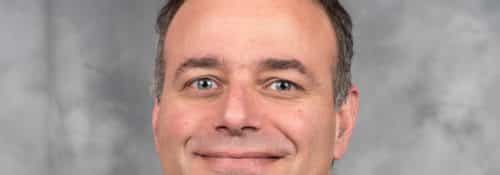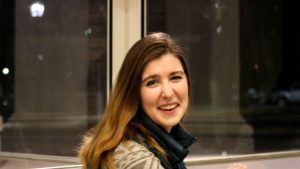
City on a Hill, Part 1
Teaching American Politics as an Immigrant from the Middle East
Written by Jacquelyn Eubanks
From our statues of George Washington and Abraham Lincoln, to our Constitution 101 and American Heritage core classes, Hillsdale College makes a point of studying and celebrating the United States. But what might that feel like for students or professors who are immigrants or citizens of other countries? According to associate professor of politics Khalil Habib, who moved to the U.S. from the Middle East, coming to America was a dream come true, and working at Hillsdale is the best place to live out that dream.
The culture of Clint Eastwood spaghetti westerns, toys like Legos, and rock‘n’roll so iconic to the United States captured the heart of Dr. Habib as a kid. The values behind them—rugged individualism, liberty, exploration, universal human rights—made America an enticing place to live.
Up until the age of nine, Dr. Habib lived on an island off the coast of Saudi Arabia called Bahrain. This island nation was run by a monarchy that dominated the vast majority of the economy. Much of his family lived in Lebanon and Syria, and although these ties made the Middle East a tempting place to stay, ultimately, his parents wanted to raise their family in the U.S. “My mother saw that our future in America would be better,” Dr. Habib said. “So it was really a no-brainer. In the end, both my parents absolutely wanted to be here.”
They moved to Houston, Texas, and loved it. “It literally satisfied every stereotype of the United States. Some of the more popular images of the U.S. in the Middle East were the spaghetti westerns. When I was growing up, the popular culture image of the United States was just that: rugged individualism, conquering a new frontier, exploration, liberty… and that’s partly why my family wanted to move to Texas. As a kid my family would watch western movies and we would say, ‘Now that’s America.’ We wanted that. There’s even photos of me as a kid in a Clint Eastwood costume, wearing a poncho and holding a fake gun… in Bahrain! I thought I was an American cowboy.”
He considers himself a rare case in the Middle East because he was one of the few Arabs in a Western, international school. Transitioning to the U.S. was very easy considering he was already used to Western culture through the European students’ influences. When he got to college, he decided to study politics so he could take his experience as an immigrant kid and teach what America stands for: freedom, individualism, patriotism, a place that recognizes rights.
“This is an enormously rare political experiment,” Dr. Habib said. “The biggest disappointment was going through the educational system and seeing Americans take for granted what they have. I could never sympathize with their criticisms of America. I was frustrated because I thought I was going to deepen my understanding of America at college, only to discover that a significant number of the educators had turned on the nation for no good reason. As an outsider who has seen civil war and who has family who has lost a lot, not to mention lives, because of religious sectarianism and political instability, to see something as extraordinary as this being taken for granted was to me the most shocking. You assume everybody loves America as much as you do, and that they are as grateful to it as you are, and they’re not.”
Dr. Habib admits he was lucky because his move to the U.S. was not out of duress; his family was not escaping tyranny or poverty. They did very well for themselves in America. Being Catholic also helped with the transition, as it is a ‘universal’ faith, not tied to one location.
“I can’t speak on behalf of all immigrants. I think everybody brings their own experiences and attitudes about the country. My first reaction to the United States is one of gratitude. The advantage I bring to the classroom is to remind people that this is the wealthiest time, the safest time, in the history of humankind, and it’s extremely fragile and can never be replicated again. I lost something; Americans could potentially lose something. My family’s roots are in a part of the world that I will never see again.”
Dr. Habib sees Hillsdale College as a fulfillment of American principles, a small republic, or polis, that he’s grateful to be a part of.
 Jacquelyn Eubanks, ’20, is an award-winning author with a passion for books, tea, and mountains. Someday she’ll be a world traveller, but for now you can find her typing away at her newest novel.
Jacquelyn Eubanks, ’20, is an award-winning author with a passion for books, tea, and mountains. Someday she’ll be a world traveller, but for now you can find her typing away at her newest novel.
Published in November 2019